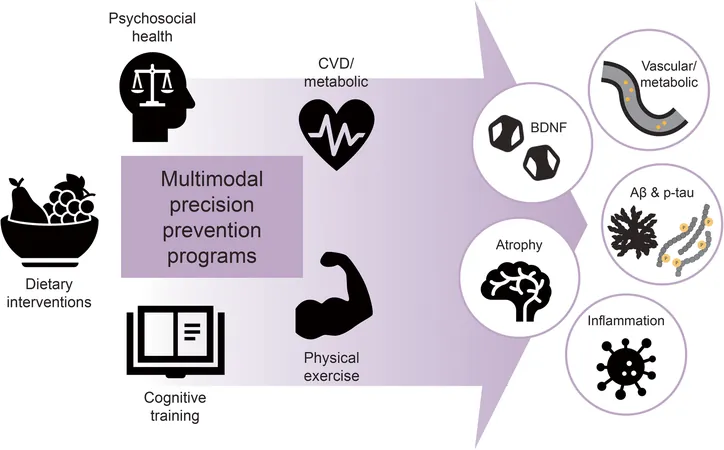
Unlocking the Secrets to Reducing Dementia Risk with Lifestyle Changes
2025-06-23
Author: Jacques
Exercise: The Ultimate Shield Against Cognitive Decline
Exercise has emerged as a powerhouse strategy for combating cognitive decline and dementia, offering significant protection over time. Multiple studies have investigated its effects on brain health, revealing both impressive gains and some unexpected inconsistencies.
The Brain on Exercise: Mixed but Promising Results
Research using advanced neuroimaging techniques has shown that structural changes in the brain can result from physical activity. While some studies indicate increased brain volumes and improved outcomes in those with mild cognitive impairment (MCI), others reveal no measurable structural benefits. The varied results may be linked to factors like the type and duration of exercise and the individual's initial health condition.
White Matter and Exercise: A Complicated Relationship
White matter integrity, a crucial indicator of brain health, appears resistant to changes from moderate exercise in older adults. Long-term, moderate activity didn’t halt the progression of white matter hyperintensities in those with MCI. However, certain groups, particularly those with higher fitness levels, showed slight improvements in specific brain regions.
Brain Function Boost: Exercise Lights Up the Mind
Functional MRI studies in healthy adults reveal that regular exercise leads to increased activation in key brain regions, promoting cognitive function. Furthermore, physical activity enhances cerebral blood flow and boosts glucose uptake in essential areas, suggesting that moving your body can indeed invigorate your mind.
Fluid Biomarkers: The Exercise Connection
Exercise also influences biomarkers linked to Alzheimer’s disease-related dementias (ADRD). For instance, participants in traditional Chinese exercise routines showed reductions in harmful tau levels in their cerebrospinal fluid compared to those receiving standard care. Conversely, moderate aerobic exercise didn’t impact amyloid levels in cognitively healthy older adults, indicating that the benefits of exercise may act through indirect pathways like reducing inflammation.
The Diet-Dementia Nexus: Food Choices Matter!
The role of diet in dementia prevention is pivotal yet complex. While a healthy diet is known to support brain health, determining which dietary components are most beneficial at different ages and disease stages needs further exploration. Dietary patterns that are rich in antioxidants and anti-inflammatory properties show promise for neuroprotection, possibly influencing dementia-related biomarkers.
Neurological Benefits of Dietary Interventions
Dietary studies reveal intriguing connections between food choices and brain health biomarkers. The MIND diet (a blend of the Mediterranean and DASH diets) demonstrated cognitive improvements and reduced hippocampal shrinkage among participants following a structured weight loss program.
Tackling Type-II Diabetes: A Key Dementia Risk Factor
Type-II diabetes is a known risk factor for dementia, with studies linking blood sugar regulation to brain health. Lifestyle interventions targeting diabetes management have shown positive outcomes on neuroimaging markers, suggesting that control of blood glucose levels can boost cognitive resilience.
Obesity and Its Double-Edged Sword in Dementia Risk
Obesity presents a unique paradox; while midlife obesity is associated with higher dementia risk, lower BMI in late life can signal underlying health issues. Addressing obesity through comprehensive lifestyle changes, including diet and exercise, has shown to improve cognitive function, especially among high-risk groups.
The Heart-Brain Connection: Hypertension and Cognitive Health
Maintaining healthy blood pressure through lifestyle modifications is essential for brain health. Evidence indicates that effective management of hypertension can safeguard against dementia's progression, preserving vital brain structures.
The Social Component: Connection is Key
Engaging in social activities boosts mental health and may lower dementia risk. Programs incorporating social interaction with physical activity, such as the FINGER study, highlight the value of community in preserving cognitive function.
Rest and Recovery: The Importance of Sleep
Sleep disturbances are linked to higher dementia risk, emphasizing the need for effective sleep interventions. New research suggests lifestyle changes and light therapies can enhance sleep quality, leading to potential neurological benefits.
Mindfulness as a Tool for Cognitive Resilience
Mindfulness and meditation have demonstrated potential cognitive benefits, although research in this area remains sparse. Participating in mindfulness exercises may counteract stress, contributing to better cognitive performance.
Toward a Personalized Approach to Dementia Prevention
With evidence mounting around the impact of lifestyle on dementia risk, tailored interventions targeting individual risk profiles become imperative. The integration of diverse lifestyle factors could pave the way for innovative, preventative strategies and potentially open avenues for drug development as we move forward.
The Future of Dementia Prevention: Closing Knowledge Gaps
Despite promising evidence linking lifestyle changes to dementia risk reduction, significant knowledge gaps remain. Further research, particularly in diverse populations, is crucial for understanding the multifaceted mechanisms at play in dementia prevention and developing personalized strategies.









 Brasil (PT)
Brasil (PT)
 Canada (EN)
Canada (EN)
 Chile (ES)
Chile (ES)
 Česko (CS)
Česko (CS)
 대한민국 (KO)
대한민국 (KO)
 España (ES)
España (ES)
 France (FR)
France (FR)
 Hong Kong (EN)
Hong Kong (EN)
 Italia (IT)
Italia (IT)
 日本 (JA)
日本 (JA)
 Magyarország (HU)
Magyarország (HU)
 Norge (NO)
Norge (NO)
 Polska (PL)
Polska (PL)
 Schweiz (DE)
Schweiz (DE)
 Singapore (EN)
Singapore (EN)
 Sverige (SV)
Sverige (SV)
 Suomi (FI)
Suomi (FI)
 Türkiye (TR)
Türkiye (TR)
 الإمارات العربية المتحدة (AR)
الإمارات العربية المتحدة (AR)